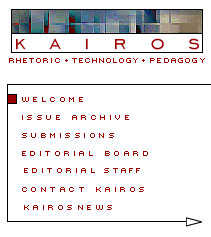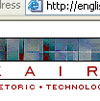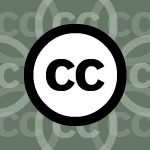Unique Position of Kairos
Why Kairos is a publication uniquely positioned in a political place that we--as teachers, researchers, and writers--should
support and embrace
There are few, if any, instances in the development of legal infrastructure and digitally mediated spaces
where writing studies has intentionally influenced decisions having a major impact on
public policy and technology use. For instance, in September 2005 a major conference took place that will help shape the future of
the Internet (Duffy, 2005). No technorhetoricians were involved. The Next Generation Internet Conference (2006) in Washington D.C.
was a forum for a debate between divergent views of the ITU (International Telecommunications
Union, 2006) and the IEFT (Internet Engineering Task
Force, n.d.).
Duffy (2005) reports that as much as 60% of Internet traffic is by way of peer-to-peer (P2P) technologies, and P2P is
exactly what the courts have
been analyzing during the last ten years with respect to the music industry and changing technologies.
Experts argue that the P2P court cases, discussed in the major cases section of
this webtext, have shaped the Internet--the networks we practice within.
Duffy (2005) states that the biggest issue to be decided at the
conference was
selecting "the next NGN (Next Generation Networks) ... The future of the Net could be shaped in large part by the need to support peer-to-peer applications and Web-based services, which use peer-to-peer protocols."
 |
Kairos is a perfect place for us to talk about how we might shape the future Internet, how we might protect the uses we have, and expand those uses so that we, as writing researchers, scholars, and teachers, can affirm our ownership of writing. For example, while I think many would agree that, in academic contexts, we own the discourse of "plagiarism" but we do not own the discourse of "fair use." Perhaps we should. Kairos is a perfect place to develop affirmations and responsibilities for this discourse because it is fitting to discuss digital technologies and writing in a digital space. Kairos, in its publication practices, tries to keep teachers' and researchers' best interests at heart; it doesn't "take all" when it comes to authors' webtexts and, in fact, authors retain copyright of their texts upon publication. |
As an online
scholarly publication, Kairos should serve as a paradigm for the field,
especially regarding IP issues.
In my view, Kairos' publication
policy is fair. It reads in part as follows:
What rights do I grant Kairos if my work is published here? Can I
publish the same work elsewhere?
Authors of accepted manuscripts assign to Kairos . . . the right to publish and distribute their
text electronically, including publication on the Web and on CD-ROM, and to
archive and make it permanently retrievable electronically. Authors retain their
copyright, however, so after their project has appeared in Kairos, they may
republish their text in any manner they wish--electronic or print--as long as
they clearly acknowledge Kairos as its original site of publication. (Kairos, 2005)
Kairos takes what rights it reasonably needs in order to publish and distribute webtexts, but it leaves the author with rights enough
to publish elsewhere. The current language on the Kairos site encourages authors to "license their work with a Creative Commons license, which allows authors
to declare what rights (if any) they are willing to grant to others to make use of their work. (However, authors whose work is
published in Kairos grant to
the journal the rights listed above; this agreement supersedes any other licensing of your
work.)."
Douglas Eyman, Senior Co-Editor of Kairos, has indicated that the journal is firmly committed to the use of
Creative Commons licensing as one
mechanism for improving the status and use of open-access journals. He said, "We definitely
support the use of Creative Commons licensing for works that appear in our
journal; one of our current projects is contacting all of the people whose
work appears in previous issues and asking if they'd like to append a CC
license to those works" (2005).
As Eyman notes, Creative Commons improves the status and appropriate use of
online journals. I agree with this. But the use of Creative Commons' licenses
in this way has not been tested in the courts (although in March 2006 a Dutch court upheld
the use of Creative Commons license for photos on Flickr). For example, the license I adopted for this
webtext, an
Attribution-NonCommercial-ShareAlike 2.5 license, gives others the right "to
copy, distribute, display, and perform the work [and] to make derivative
works" (Creative Commons) But what is a "derivative" work? This issue has been
litigated in courts previously and is by no means resolved. Such licenses also require users to interpret what "Noncommercial" means. The question arises, what is the difference, if any, between educational use and noncommercial use? The commercial or noncommercial nature of a use is subject to interpretation.
The position we should take as we write in digital environments should always be a critical stance. Being aware of use policies in the digital spaces we frequent and sharing this knowledge with students is to everyone's benefit. For instance, online spaces supported by social network software such as Myspace and Facebook have “take all” use policies. Our students need to know exactly what they are giving away when they post treasured family pictures to such spaces. One way to teach students about these policies is by exploring them in class. As for our own writing outlets, academics should understand the publication agreements that we sign. For example, it's not unusual for authors to sign publishers’ agreements that state the publisher receives the right to perform, display, reproduce the work, distribute the work, and create derivative works but the author retains the “copyright.” In a contract like this, the copyright is nothing more than an empty shell containing no rights at all, since the publisher has taken them all. Kairos does not require a signed agreement but simply requests acknowledgment in future publications. By not requiring a signed agreement, Kairos supports open-access--in the same way that the Social Science Research Network does. SSRN is not a peer-reviewed journal like Kairos, but it provides a space for publication and clearly states that it takes no rights to any materials published. Technorhetoricians should pay close attention to such publication agreements, and even perhaps frequent and carefully support those publications that align politically with their own individual values. There really are no easy solutions at the present moment. But we can educate ourselves and each other, conduct research on writing practices in digital forums, keep current on law and policy issues that unfold; taking a critical stance allows each of us to exercise agency over the texts we create. It's this kind of critically based, metacognitive awareness of its orientation as an online publication in the field of rhetoric and composition that makes Kairos appealing. Other open-access journals would do well to use Kairos as a paradigm.
|























